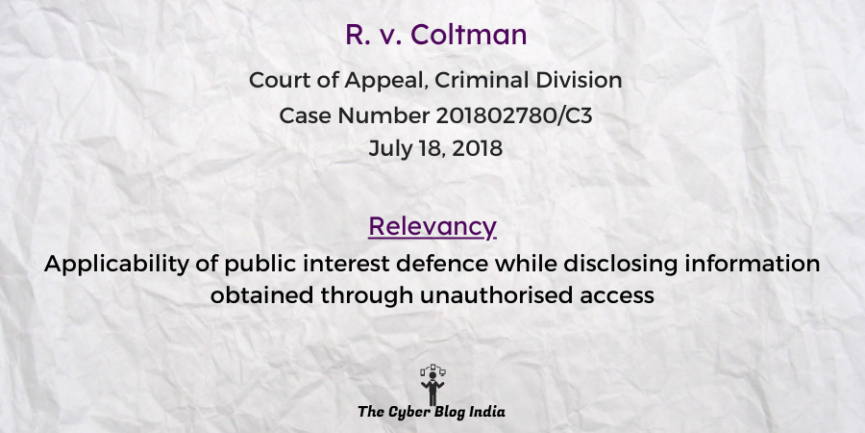R. v. Coltman

R. v. Coltman
[2018] EWCA Crim 2059
In the Court of Appeal, Criminal Division
Case Number 201802780/C3
Before Lady Justice Raffertydbe, Justice Picken, and Sir Brian Keith
Decided on July 18, 2018
Relevancy of the case: Applicability of public interest defence while disclosing information obtained through unauthorised access
Statutes and Provisions Involved
- The Computer Misuse Act, 1990 (Section 1)
- The Criminal Procedure and Investigation Act, 1996 (Section 35(1), 36)
- The Criminal Justice Act, 1987 (Section 9(11))
- The European Convention on Human Rights 1950 (Article 2, 3, 8, 10)
- The Human Rights Act, 1998
- The Freedom of Information Act, 2000
Relevant Facts of the Case
- The appellant, employed by NHS England, accessed a colleague’s computer without authorisation and obtained a file related to an internal investigation about undelivered clinical correspondence.
- He later gave the file to a journalist at a national newspaper.
- The appellant claimed that the disclosure was in the public interest due to risks to patient’s health and lives and alleged a cover-up related to NHS privatisation.
Prominent Arguments by the Counsels
- The appellant’s counsel argued that the appellant’s actions were justified under a public interest defence. He asserted that disclosing the material was necessary to protect public health. He contended that the absence of a public interest defence in the Computer Misuse Act 1990 was incompatible with the European Convention on Human Rights. Furthermore, he argued that accessing information should be permissible when it is in the public interest, just as disclosing it should be.
- The respondent’s counsel submitted that the Computer Misuse Act does not provide for a public interest defence and that unauthorised access to data is unlawful. He argued that the appellant could have obtained the information through other legal means, such as the Freedom of Information Act 2000.
Opinion of the Bench
- The appellant’s action did not engage his rights under Articles 2, 3, and 8 of the European Convention of Human Rights.
- Moreover, unauthorised access to data is distinct from its disclosure.
- There is no error in the trial court’s judgment.
Final Decision
- The court dismissed the appeal and ruled that no public interest defence was available for charges under Section 1 of the Computer Misuse Act 1990.
